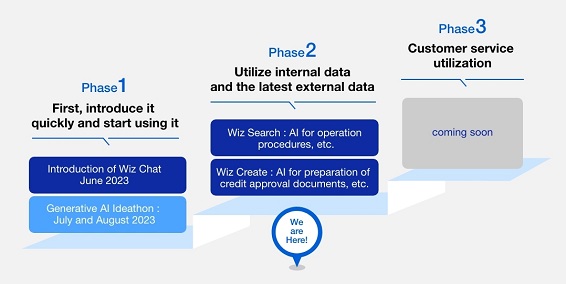Mizuho's vision for finance in 10 Years: Utilizing generative AI to boost operational efficiency and achieve new innovation
Mizuho Digital Transformation
December 28, 2023

Mizuho Digital Transformation
December 28, 2023

With generative AI gaining popularity, Mizuho has taken swift steps to introduce in-house AI text generators that can be used by all Mizuho employees in Japan. For our next initiative, we are exploring the use of generative AI to improve operational efficiency, targeting processes that require large amounts of time and resources, namely the handling of inquiries on administrative procedures and preparation of credit approval documents. By introducing AI chat for inquiries on administrative procedures, we aim to shorten the work time required and respond flexibly to customers, and are currently conducting proof of concept. We are improving the process for preparing credit approval documents by developing AI tools that support this process by enabling automatic creation of approval document drafts with a single click. Moreover, initiatives proposed by employees to utilize generative AI are also gathering pace. Behind this is Mizuho's strong desire to look ahead to the future that will exist ten years from now.

Use of AI that generates text has rapidly spread since the end of 2022, and the emergence of this innovative technology is changing the way people live and work. At Mizuho, we began considering the introduction of generative AI in late February 2023 to explore future ways of working that utilize this technology, including for methods to improve operational efficiency. In June, we introduced an in-house text-generating AI system called Wiz Chat. Subsequently, we had employees experiment using it in their work and share utilization methods via an in-house social network. During July and August, we held an "ideathon" on ways to use generative AI, resulting in over 2,000 ideas from employees!
In addition, to create points of contact with generative AI throughout the Mizuho group, we established three phases in our plan to utilize it. In Phase 1, we rapidly introduced generative AI and started experimenting with its use inside the group. The introduction of the above-mentioned Wiz Chat and the holding of the ideathon were part of this phase. In the current Phase 2, we are utilizing the latest external data in addition to internal data to promote operational efficiency, and in Phase 3, we will also utilize internal and external data to improve customer services through means such as hyper-personalized marketing.
In Phase 2, we are developing the Wiz series (including both Wiz Search and Wiz Create), which is the generative AI application that will follow Wiz Chat. The Wiz series is being used to streamline the processes for handling inquiries on administrative procedures and preparation of credit approval documents, which require a large amount of time and resources. Inquiries on administrative procedures are helped by one of the functions of Wiz Search, which focuses on search and supports Q&A related to business operations. The Wiz Create series focuses on content creation and mainly supports the preparation of credit approval documents (as of December 2023). Both of these tools are expected to be highly effective for improving operational efficiency and we are prioritizing their verification due to their versatility. Mizuho plans to use these as a starting point to expand the use of generative AI to other processes as well.

Handling of inquiries on administrative procedures is a task where many people in the field are calling for the use of generative AI. Mizuho's existing administrative procedures serve as a guideline for providing services. They describe basic methods and risks so that all employees can provide services efficiently and free of errors. However, they cover a wide range of areas, and the procedures alone extend to 30,000 pages. The materials — such as various guides and FAQs that explain the criteria for decisions and how to approach specific matters — are not systematically organized, and the search method is complicated. We have received concerned comments from staff, that include not knowing where to look, being worried about accidentally omitting procedures, and not knowing where to start. Currently, it takes time and effort to call the administrative procedure inquiry service, an in-house support desk for fielding questions to and confirming how to proceed with operations.
An inquiry on an administrative procedure is taken to include the series of steps leading up to and including the act of making an inquiry to the administrative procedure inquiry service. Until now, Mizuho has made the best efforts within its means to provide the service, with steps such as revising the administrative procedures based on suggestions of staff using the manuals, and by introducing AI chat tools. However, in the end the system relies on inquiries made over the phone, which places a heavy burden on both the person making the inquiry and the person receiving it. Due to factors like these, we are rapidly conducting a proof of concept for use of generative AI to reduce the operational burden and improve operational efficiency of handling inquiries.
As one step, Mizuho built a chatbot that links generative AI with internal information (administrative procedures and related information, etc.). Using this, we are verifying whether we can generate responses to varied and wide-ranging inquiries that display an understanding of the intent of inquirers' questions. There are many challenges in creating a system that can respond flexibly, including confirming the meaning of ambiguous inquiries and summarizing the key issues, giving advice on how to proceed, and proposing steps for individual cases. Up until now, this has required a human. Mizuho is moving forward with development to explore the possibilities for how far generative AI can go in responding to inquiries, in collaboration with staff members who actually receive calls regarding administrative procedures.
Of course, it is difficult to produce generative AI with the same quality as human operators who have advanced knowledge and experience. That is why we believe it is meaningful to conduct a proof of concept. By utilizing generative AI, simple tasks will be carried out more efficiently. By freeing up time for people to concentrate on matters that require more advanced judgment, we hope to be able to provide flexible services that take into account the characteristics and needs of our customers.

Another work process where we plan to utilize generative AI is the preparation of credit approval documents. This refers to the preparation of materials to be used as the criteria for making decisions about lending to corporate customers. Loans are a core business for banks, and preparing credit approval documents is essential for conducting appropriate screening.
When preparing credit approval documents, in addition to verifying the customer's business, it is necessary to verify certain information which varies according to the type of loan. Traditionally, this has been done by reviewing the prepared materials each time with the support of the credit department. However, this job requires a large amount of time and personnel due to disparities in experience and skills because of the increasing proportion of young corporate relationship managers and mid-career hires. As a result, the work of creating credit approval documents has become one of the tasks that hinders customer support, in areas such as offering proposals, which should be the real job focus of corporate sales staff.
On-site issues like this are the reason why we are working to improve operational efficiency using generative AI, and our aim is to create a system that can automatically generate approval document drafts with one click. When this system is realized, sales staff will be able to create materials automatically according to the type of loan, such as for working capital or equipment financing, by importing into the system financial statements and the interview records created and confirmed during loan consultations. This will not only reduce the time required for each case to about 10 minutes from an average of around 1 to 2 hours but will also enable us to effectively maintain a certain level of quality for approval documents.
In this way, boosting speed and sophistication for the process of preparing approval documents will save time by reducing the operational burden and eliminating the effect of individual skill gaps between employees, and this in turn will yield value for customers, including increasing the speed of our response to them and the frequency that solutions can be provided.
Furthermore, we are also considering adding functions, such as a screening chatbot that will remind staff of the points they need to verify in order to finish the approval decision process. Also, while these ideas currently remain a vision, it may become possible one day to automatically transcribe conversations with customers, incorporate them into data, and create a draft of the approval documents when staff return to the branch. We are aiming for a future in which highly sophisticated operations can be conducted seamlessly.

At Mizuho, initiatives proposed by employees to utilize generative AI are also steadily gathering pace. At the in-house Generative AI Ideathon, ideas such as AI-based determination of investment capability and AI-based proposal preparation were proposed, and these ideas are already on the fast track toward realization.
AI-based determination of investment capability is based on the idea for determining if a decline in a customer's cognitive and decision-making ability has occurred by inputting the customer's non-financial data. By utilizing AI, we aim to provide services in accordance with our fiduciary duties and simplify operational procedures, taking into consideration the circumstances of each individual customer rather than providing a uniform response based on age.
AI-based proposal preparation, meanwhile, concerns the idea to automatically create proposals, which currently requires hours of work since information needed for analysis is spread out both inside and outside the company. By inputting information held by Mizuho and internal and external reports, we can identify the needs of each individual company. Using Wiz Create, which specializes in creating content in specified formats, we aim to automatically generate optimal proposals personalized for each customer.
Generative AI, including the examples introduced here, is expected to bring about a paradigm shift in people's lives and society in the future. Financial institutions are no exception to this, and traditional business models centered on people and stores will be forced to change. In light of this situation, Mizuho is formulating strategies with an eye on the future of finance 10 years from now through the application of generative AI to its own operations.
There is still room for debate as to how to utilize the time freed up by the improvement of work efficiency. We will of course adhere to ethics, laws, regulations, and industry standards in the use of AI, and carry out responsible AI promotion. Furthermore, we will create innovations, such as new systems using generative AI, and engage in educational activities by providing managers with information on the latest trends and analysis of their impact on the industry. Through this, Mizuho will continue to push forward with the use of AI and advanced technology to enhance the user experience, improve business efficiency, and cultivate new markets.